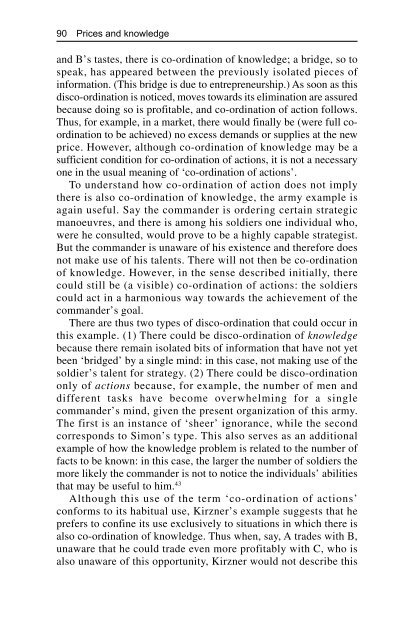Prices and knowledge: A market-process perspective
Prices and knowledge: A market-process perspective
Prices and knowledge: A market-process perspective
Create successful ePaper yourself
Turn your PDF publications into a flip-book with our unique Google optimized e-Paper software.
90 <strong>Prices</strong> <strong>and</strong> <strong>knowledge</strong><strong>and</strong> B’s tastes, there is co-ordination of <strong>knowledge</strong>; a bridge, so tospeak, has appeared between the previously isolated pieces ofinformation. (This bridge is due to entrepreneurship.) As soon as thisdisco-ordination is noticed, moves towards its elimination are assuredbecause doing so is profitable, <strong>and</strong> co-ordination of action follows.Thus, for example, in a <strong>market</strong>, there would finally be (were full coordinationto be achieved) no excess dem<strong>and</strong>s or supplies at the newprice. However, although co-ordination of <strong>knowledge</strong> may be asufficient condition for co-ordination of actions, it is not a necessaryone in the usual meaning of ‘co-ordination of actions’.To underst<strong>and</strong> how co-ordination of action does not implythere is also co-ordination of <strong>knowledge</strong>, the army example isagain useful. Say the comm<strong>and</strong>er is ordering certain strategicmanoeuvres, <strong>and</strong> there is among his soldiers one individual who,were he consulted, would prove to be a highly capable strategist.But the comm<strong>and</strong>er is unaware of his existence <strong>and</strong> therefore doesnot make use of his talents. There will not then be co-ordinationof <strong>knowledge</strong>. However, in the sense described initially, therecould still be (a visible) co-ordination of actions: the soldierscould act in a harmonious way towards the achievement of thecomm<strong>and</strong>er’s goal.There are thus two types of disco-ordination that could occur inthis example. (1) There could be disco-ordination of <strong>knowledge</strong>because there remain isolated bits of information that have not yetbeen ‘bridged’ by a single mind: in this case, not making use of thesoldier’s talent for strategy. (2) There could be disco-ordinationonly of actions because, for example, the number of men <strong>and</strong>different tasks have become overwhelming for a singlecomm<strong>and</strong>er’s mind, given the present organization of this army.The first is an instance of ‘sheer’ ignorance, while the secondcorresponds to Simon’s type. This also serves as an additionalexample of how the <strong>knowledge</strong> problem is related to the number offacts to be known: in this case, the larger the number of soldiers themore likely the comm<strong>and</strong>er is not to notice the individuals’ abilitiesthat may be useful to him. 43Although this use of the term ‘co-ordination of actions’conforms to its habitual use, Kirzner’s example suggests that heprefers to confine its use exclusively to situations in which there isalso co-ordination of <strong>knowledge</strong>. Thus when, say, A trades with B,unaware that he could trade even more profitably with C, who isalso unaware of this opportunity, Kirzner would not describe this
















